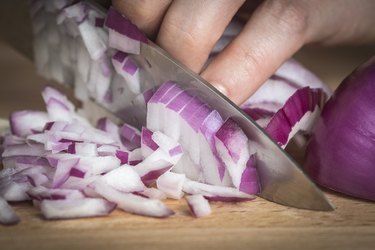
You may love onions, but that doesn't mean they love you back. For some, these often pungent and aromatic bulb-shaped veggies cause more than just watery eyes and bad breath. Learn why, as well as ways to make onions not upset your stomach by cooking or changing portions.
Onion digestion can trigger gas, bloating and an upset stomach, according to Robin Foroutan, RDN, a registered dietitian nutritionist at the Morrison Center in New York City and spokesperson for the Academy of Nutrition and Dietetics.
Video of the Day
Video of the Day
So does that mean onions are hard to digest or take longer to digest than other foods? "It is not that onions take longer to digest, it's that they have compounds in them that can be difficult to digest," she says. On average, the entire digestive process takes about two to five days from the time you swallow to the time something leaves your body, according to the Mayo Clinic.
Onions have healthy perks, too — they're rich in vitamin C and many B vitamins, potassium and a potent heart-healthy antioxidant called quercetin, Foroutan says. Onions can also help lower your blood sugar, strengthen your bones and ward off disease. If you can safely eat onions, it's well worth it.
Read more: The Side Effects of Eating Onions
1. FODMAPs
If you find yourself wondering "Why can't I eat onions anymore?," it could be the FODMAPs in onions, according to the Academy of Nutrition and Dietetics. FODMAP stands for fermentable oligosaccharides, disaccharides, monosaccharides and polyols.
Onions contain fructans, an oligosaccharide, or carbohydrate, that's not broken down well by your gut, so it sits and ferments there. This can disrupt the balance of good and bad bacteria in your gut and cause gas and bloating. If you also get these symptoms from other foods high in fructans, like garlic, wheat products and artichokes, FODMAPs could be the cause of your discomfort.
Fix it: Eliminate FODMAPs from your diet and then strategically add them back with the help of a dietitian or doctor, Foroutan says. "The net-net is that there might be one or two categories of FODMAPs that you don't tolerate very well."
Supplemental digestive enzymes may help you break down these carbohydrates in general more efficiently, Foroutan says. But these products are not regulated closely by the Food and Drug Administration, according to the National Center for Complementary and Integrative Health, so it's best to work with your doctor for specific advice on any supplements that may help you.
2. Sulfur
Onions, along with other members of the allium family like shallots, chives and garlic, are high in sulfur. "If you have an allium or sulfur intolerance or allergy, it can manifest as nausea, cramping, indigestion, diarrhea or even breathing difficulty, itching, hives and/or headache," Foroutan says.
Fix it: See an allergist to find out if you are allergic and need to avoid all onions and any prepared, processed and packaged foods that contain onions.
If you have a food intolerance, experiment to see the amounts you can eat before symptoms kick in. If you love the taste and flavor of onions, but still can't tolerate them, try sautéing onion in a healthy oil, then discard the onions themselves, and use the infused oil to flavor your favorite dishes, Foroutan says.
Read more: What You Need to Know About Elimination Diets
3. Heartburn From Other Compounds
Other compounds in onions can trigger heartburn shortly after eating, especially if they're raw, Foroutan says. "Raw onions are a common heartburn trigger because they can relax the sphincter muscle between the stomach and esophagus."
The sphincter acts as a valve to keep the acid in the stomach and out of the esophagus, but when it relaxes inappropriately, stomach acid can flow backward into the esophagus, causing heartburn, according to the American College of Gastroenterology.
Fix it: Remove onions from your diet for a few weeks and then add back a small amount of cooked onions, which are easier to digest and less likely to cause heartburn than raw ones, Fourotan says.
"If that goes well, try a small amount of raw onion and see how it feels," she says. "It may be that you can tolerate small amounts of onion, but not large amounts." It may require trial and error to find your personal upper limit.
- Robin Foroutan, MS, RDN, HHC, registered dietitian nutritionist, Morrison Center, New York, New York; spokesperson, Academy of Nutrition and Dietetics
- Mayo Clinic: “Digestion: How Long Does It Take?”
- Academy of Nutrition and Dietetics: “What Is the Low FODMAP Diet?”
- American College of Gastroenterology: “Acid Reflux”
- National Center for Complementary and Integrative Health: “Dietary and Herbal Supplements”
Is this an emergency? If you are experiencing serious medical symptoms, please see the National Library of Medicine’s list of signs you need emergency medical attention or call 911.